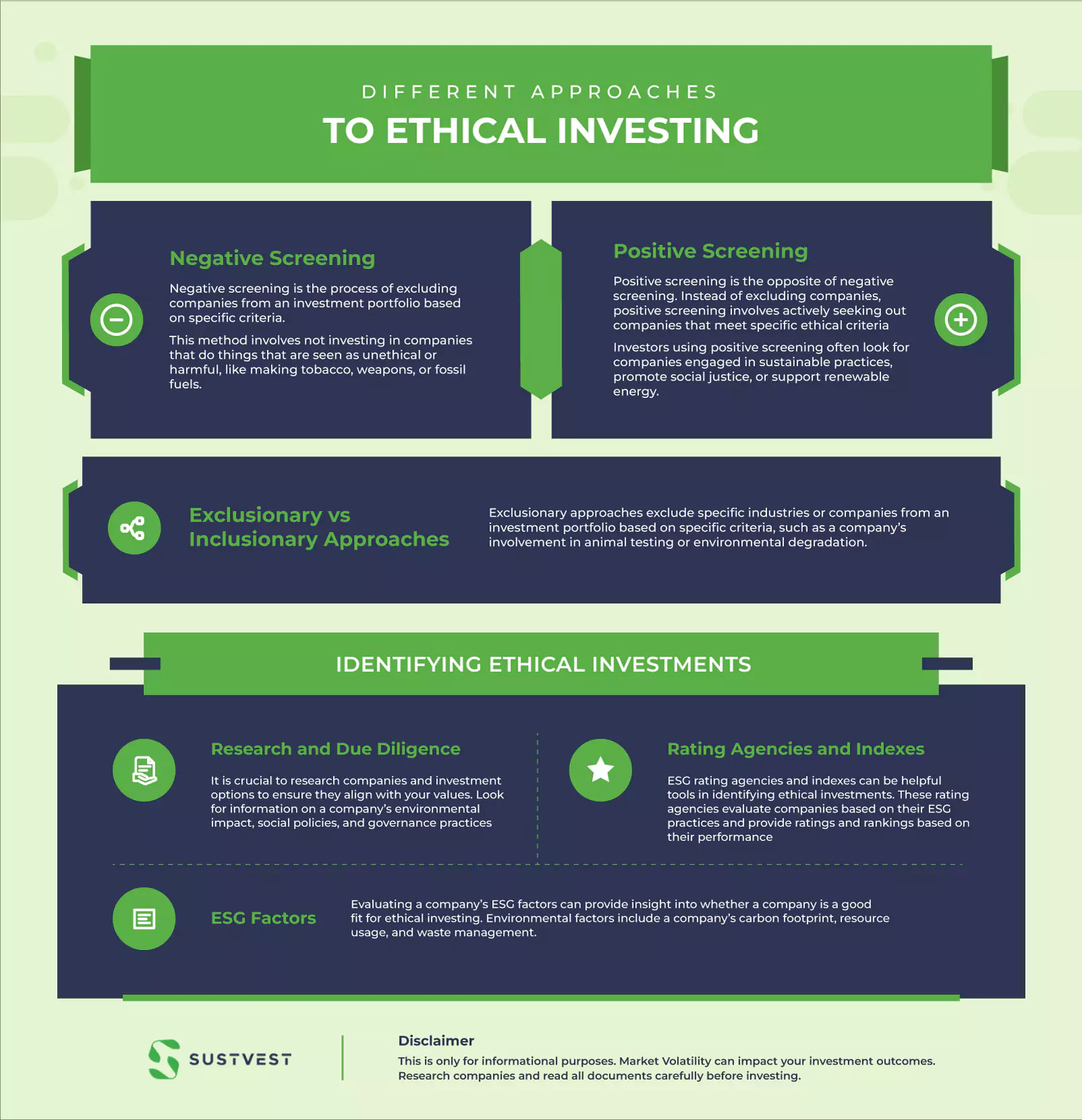Ethical investing, often known as socially responsible investing, considers an investment’s financial and moral impacts. Ethical investing combines personal ideals with investment decisions to improve society and the environment.
This article will define ethical investment, explain how it works, and discuss the advantages and disadvantages of choosing this approach.
We will also provide tips for identifying ethical investments and discuss the importance of due diligence in making informed decisions.

What is Ethical Investing?
Ethical investing is often known as socially responsible investing (SRI). Ethical investment is an investment approach that aims to reconcile personal principles with financial goals by investing in companies or funds that meet ethical or moral standards.
It considers a company’s financial performance and environmental, social, and governance (ESG) issues, such as its environmental effect, employee treatment, and business practices.
It is based on different rules for each investor, which can be affected by their religious or cultural beliefs, personal ideals, and social and political concerns.
Some investors may avoid investing in companies that engage in activities such as tobacco or weapons production, while others may prioritize companies with strong ESG performance.
For details about investing and trading, check out our blog on the difference between investing and trading here.
Different Approaches to Ethical Investing
There are different approaches to ethical investing, each with its principles and strategies.
- Negative Screening
Negative screening is the process of excluding companies from an investment portfolio based on specific criteria.
This method involves not investing in companies that do things that are seen as unethical or harmful, like making tobacco, weapons, or fossil fuels.
Negative screening is often the first step for investors new to ethical investing.
- Positive Screening
Positive screening is the opposite of negative screening. Instead of excluding companies, positive screening involves actively seeking out companies that meet specific ethical criteria.
Investors using positive screening often look for companies engaged in sustainable practices, promote social justice, or support renewable energy.
- Exclusionary vs Inclusionary Approaches
Exclusionary approaches exclude specific industries or companies from an investment portfolio based on specific criteria, such as a company’s involvement in animal testing or environmental degradation.
In contrast, inclusionary approaches involve selecting investments that meet specific ethical standards, such as a company’s commitment to renewable energy or fair labor practices.
Pro Tip: Choose an investment approach aligning with your values and financial goals. Assess risks and returns, and conduct due diligence, as ethical investing isn’t universal.
Identifying Ethical Investments
Research and due diligence are crucial when it comes to ethical investing.
Conducting thorough research on a company’s ESG practices can help investors ensure that their investments align with their values. Due diligence can also help identify potential risks or red flags associated with an investment.
Investors can make informed judgments that match their values and financial goals by researching and evaluating investing options.
Here are some tips for identifying ethical investments:
- Research and Due Diligence
It is crucial to research companies and investment options to ensure they align with your values. Look for information on a company’s environmental impact, social policies, and governance practices.
Websites such as CSRHub, Sustainalytics, and MSCI ESG Research provide companies with ESG (Environmental, Social, and Governance) ratings.
- Rating Agencies and Indexes
ESG rating agencies and indexes can be helpful tools in identifying ethical investments. These rating agencies evaluate companies based on their ESG practices and provide ratings and rankings based on their performance.
Some popular ESG rating agencies and indexes include the Dow Jones Sustainability Index, FTSE4Good Index Series, and the MSCI ESG Leaders Index.
- ESG Factors
Evaluating a company’s ESG factors can provide insight into whether a company is a good fit for ethical investing. Environmental factors include a company’s carbon footprint, resource usage, and waste management.
Social factors may include employee treatment, human rights policies, and community engagement. Governance factors may include executive pay, board diversity, and shareholder rights.

Benefits
Now, let’s take a closer look at the benefits of ethical investing and why it may be a worthwhile investment strategy.
- Values Alignment: Ethical investing allows investors to align their investments with their personal values and beliefs. It provides an opportunity to invest in companies that share the same ethical and moral principles as the investor.
- Positive Social and Environmental Impact: Ethical investing supports companies that promote sustainability, social fairness, and human rights.
- Financial Returns: Ethical investing has been shown to generate comparable or even better financial returns than traditional investing. A study by Morgan Stanley found that sustainable funds have equal or higher median returns and equal or lower volatility than traditional funds.
- Long-term Stability: Companies that have good ESG practices are more likely to be stable and successful in the long run. They know how to deal with risks better and are less likely to have legal or social problems.
- Consumer Demand: Ethical investing is gaining popularity as more consumers become conscious of the impact of their investments. Therefore, ethical investing can be useful to a company’s image and market share, which will result in growth and stability in the long run.
Risks
Even though ethical trading is gaining popularity, there are still some risks associated with it. Some of the main risks include:
- Limited Investment Options: Ethical investing often excludes certain industries or companies from an investment portfolio. This may limit investing possibilities, which may affect portfolio performance.
- Lower Returns: Some investors believe that ethical investing may result in lower returns compared to traditional investing. This is because companies that prioritize ethical and sustainable practices may have higher operating costs, which could impact their profitability and, ultimately, their stock prices.
- Subjective Nature of Ethical Investing: There is no one way to define an ethical investment, and different investors may have different values and goals. This can make it challenging to identify and evaluate ethical investments and may lead to disagreements about what is considered ethical.
- Misleading Marketing: Some companies may use misleading marketing to portray themselves as more ethical or sustainable than they actually are. This can make it difficult for investors to evaluate a company’s ethical practices accurately.
- External Factors: External factors such as changes in regulations, market conditions, or public sentiment can impact the performance of ethical investments. For example, a change in government policies or public opinion about a particular industry could negatively impact the performance of an ethical investment in that sector.
Even with these risks, ethical investing is growing in popularity, and people want to know more about related topics like How Does Social Entrepreneurship And Impact Investing Address Environmental Challenges?
Tips for Ethical Investing
To minimize the risks and maximize the benefits of ethical investing, there are several tips that investors can follow. By incorporating these tips into their investment strategy, investors can align their financial goals with personal values.
- Set Clear Goals and Expectations
Before investing, it’s important to identify your personal values and priorities. This can help you identify your most important ethical issues and guide your investment selections.
- Diversify Your Portfolio
Diversification is important in all types of investing, including ethical investing. By spreading your investments across different industries and asset classes, you can reduce your risk and potentially increase your returns.
If you know what portfolio diversification, and why is it Important? You’ll be able to diversify properly and get good returns with fewer market fluctuations to worry about.
- Stay Informed
To stay up-to-date on ethical investing opportunities, consider the following:
- Follow ethical investing news and blogs
- Join groups or forums
- Look for ethical investment funds or robo-advisors
- Check for ESG ratings or sustainability reports for companies you’re interested in
- Attend conferences or events.
- Be Mindful of Greenwashing
Some companies may make false or exaggerated claims about their ethical or sustainable practices.
It’s important to conduct thorough research and due diligence before investing in any company or fund and look for independent verification of their ethical or sustainability credentials.
- Consider Impact Investing
Impact investment is investing money into companies or organizations that do good things for society or the environment, as well as making money.
This can be a way to put your investments in line with your values and make a change in the world at the same time.
FAQs: Ethical Investing
What is the Difference Between Negative Screening and Positive Screening in Ethical Investing?
Negative screening involves excluding certain industries or companies from an investment portfolio, while positive screening involves actively seeking out companies that meet certain ethical or sustainable criteria.
How do I Evaluate a Company’s ESG factors for Ethical Investing?
ESG stands for environmental, social, and governance factors. To evaluate a company’s ESG factors, you can look at their corporate social responsibility (CSR) reports, sustainability reports, and other publicly available information. You can also use ESG rating agencies to assess a company’s ESG performance.
Can Ethical Investing Lead to Lower Returns?
In some cases, ethical investing may lead to lower returns, as companies that prioritize ethical and sustainable practices may have higher operating costs. However, there is also evidence to suggest that companies with strong ESG performance may outperform their peers in the long run.
What are the Benefits of Impact Investing?
Impact investing involves investing in companies or organizations with the intention of generating positive social or environmental impact alongside financial returns. The benefits of impact investing include the potential for both financial returns and social or environmental impact, as well as the opportunity to align investments with personal values and principles.
How can I Stay Informed about Ethical Investing opportunities?
You can stay informed about ethical investing opportunities by subscribing to industry newsletters and publications, following blogs and social media accounts, attending conferences and events, and working with a financial advisor who specializes in it.
Conclusion
Ethical investing allows investors to align their values and principles with their portfolios. This sort of investing has risks, but the potential personal and financial benefits make it worth considering for many.
One platform that can assist in ethical investing is SustVest. SustVest offers a user-friendly platform that allows investors to invest in companies with favorable ESG practices.
By using SustVest, investors can positively impact the world while also achieving their financial goals.

Founder of Sustvest
Hardik completed his B.Tech from BITS Pilani. Keeping the current global scenario, the growth of renewable energy in mind, and people looking for investment opportunities in mind he founded SustVest ( formerly, Solar Grid X ) in 2018. This venture led him to achieve the ‘Emerging Fintech Talent of the Year in MENA region ‘ in October 2019.




